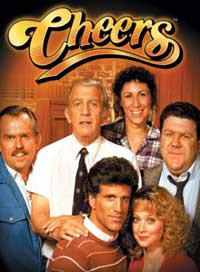In yesterday’s All Things Considered, NPR commentator Jake Halpern questions why you feel like you have a relationship with the characters in your favorite TV shows. His answer: “That’s because you do.” This idea is interesting not just to help us understand how we relate to imaginary characters, but also to correlate with our own understanding of Dunbar Number relationship limits and how they might relate to this concept.
In his commentary, Bostonian Jake Halpern considers two academic ideas, “belongingness theory” and “para-social relationships”, and how they affect the relationships we develop with television characters. He puts it all in the context of the 1990s TV show Cheers:
“My preoccupation with Cheers the Bar puzzled me until I stumbled upon a rather obscure but quite fascinating academic notion called belongingness theory_.The argument goes something like this: in ancient times humans who stuck together increased the chances that they would survive and reproduce. So, when it came time to, say, hunt a large animal, or defend the cave against marauders, groups fared better then the guy on his own. In addition, adults in the group would have been more likely to find mates, reproduce, and raise their children._
The likely result of all this evolutionary selection is the creation of an internal mechanism that makes human beings crave social acceptance. The way I figured it, my irrational fondness for Cheers the Bar was just my belongingness mechanism kicking. I just wanted to be part of the gang.”
Belongingness theory seems to have a good scientific basis. In Baumeister & Leary’s 1995 paper on Belongingness Theory, The Need to Belong, they stated that in order for belongingness to be considered a fundamental human motivation (as opposed to a want), it would have to be universal, affect a broad range of behaviors, lead to ill effects when thwarted, and elicit goal-oriented behavior designed to satisfy it. They found evidence for all of these.
Personally, I’m quite comfortable with the idea that evolution has encouraged us to have a number of “social emotions”, and that these may include a strong desire to belong.
Halpern continues in his commentary with a discussion of para-social relationships:
“And this brings to yet another academic theory, that of para-social relationships_. According to academics Horton and Wohl, who originated this concept, television gives viewers the “illusion of a face-to-face relationship with the performer”. Gradually over the course of many episodes, viewers come to feel that they ‘know’ a persona._
…
I totally buy it. After watching dozens of Cheers episodes, I felt as if I knew the personas in the show intimately. In fact there were times when I had seen more of the characters on Cheers then I seen of the people in my own family. So, yeah, I definitely had some para-social relationships going on.
The truth is, we all yearn for companionship. The only problem is, that for many of us, myself included, the notion of a well-functioning family and a welcoming group of friends and co-workers, is occasionally more easily found on television or in the movies, than in life itself.
After all, in order to maintain ‘real’ relationships, you have to put in a tremendous amount of effort: making phone calls; returning emails; planning weekends together; etc. To maintain para-social relationships, however, all you have to do is flick on the TV.
If I’m being honest with myself, I have to admit that at times, Norm, Cliff, Carla, and Sam have formed, well, a kind of para-family to which I yearn to belong. I suppose that hideously hackneyed as it sounds, it’s just like the show’s theme song goes: “Sometimes you want to go where everybody knows your name, and they’re always glad you came.” Only, they don’t know your name, and they really don’t know you came.”
Jake’s description of Horton & Wohl’s theory on para-social relationships definitely parallels my thoughts in a previous post Dunbar Triage: Too Many Connections where I ask “How do I maintain meaningful relationships with over 300 people?” As Jake said, it’s difficult because you have to make the effort: the phone calls, the emails, meeting in person, and all the rest.
However, the concept of having real relationships with television characters might give us enlightenment into some other relationship issues. I personally find it difficult to reconcile the mismatch between my number of connections and my own limits due to the Dunbar Number; intuitively I feel that limiting my television watching can help. This is because these TV relationships are what I call “junk relationships”. Sometimes when I talk about the concept of the Dunbar Number, I said that we may have difficulty even reaching the Dunbar limit of 150 people because of the “junk relationships” we maintain.
Does every ongoing para-social relationship with an ongoing series character, such as Cliff on Cheers or Kate on Lost, lower the number of relationships we can have with real people? I believe that this may be so.
And, if so, the answer to maintaining more connections with real people may be simply to turn off the television and tune in the real world instead.
Some related posts about group behavior:
Comments
That does not bode well for those of us with “relationships” to multiple blogs we read regularly…..
Reb Yudel 2005-08-04T19:23:31-07:00
How did the link to this blog get into the blog on server side browser. That blog does not even allow comments so that one can ask questions like that. That blog has given links to some 100 blogs that have nothing to do with server side browsing. I hope I’d be in order if I enter a link to one such blog below. http://www.newerawisp.blogspot.com
Satish Bhardwaj 2005-09-15T13:05:53-07:00
What about characters in books? Should I stop reading the Diskworld series?
Ford 2008-02-01T10:20:18-07:00
Life With Alacrity
© Christopher Allen


